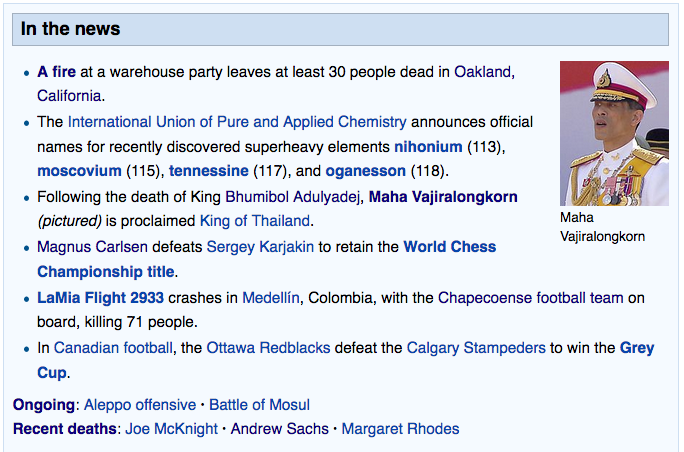A couple of weeks ago, oversaturated with news and commentary about Donald Trump that I’d been following nonstop for months, I decided to take a break from Facebook and most other social media and news sites. The last time I took a Facebook break, I was soon nagged by e-mails I didn’t sign up for about posts I didn’t care about; the same thing happened this time, and I had to unsubscribe from yet another notification list. I haven’t removed myself from the site completely, but avoiding posting and reading items in my news feed has been a welcome break.
While I tried to avoid reading or watching the news as well, I did happen to look at SFGate, and saw news about a fire in Oakland. Not realizing the scope of the disaster, I didn’t think much about it until I got a text from Ziggy, asking if I knew anyone who was there. Neither of us did, but we both had friends who were listed as “interested” in the Facebook event for the ill-fated concert at the Ghost Ship on December 2. This motivated me to read more about the incident, and I began contributing a substantial amount to the Wikipedia article on the fire. That article made the top of the “In the news” section of Wikipedia’s front page on December 4. (There wasn’t a good photo for the article available at the time of this screenshot; I later found some photos of the fire on Flickr, and convinced the photographer to upload them to Wikimedia Commons.)
 [Image: A screenshot of Wikipedia’s “In the news” section. The top line reads, “A fire at a warehouse party leaves at least 30 people dead in Oakland, California.”]
[Image: A screenshot of Wikipedia’s “In the news” section. The top line reads, “A fire at a warehouse party leaves at least 30 people dead in Oakland, California.”]
Ultimately, 36 lives were lost in the fire. A number of the victims were from the LGBT+ community; several articles noted that the friends and family members of the trans victims were struggling with authorities and media sources misgendering and deadnaming them.
This tragedy got me thinking about Facebook and the value of social media in spreading information in times of emergency. Coincidentally, I had just read an article in Wired (not currently available online) that talked about “Facebook Safety Check”, which has been deployed to help people find out if their friends are safe. The program has not been without controversy, but clearly many have found it helpful. As many issues as I have with Facebook, I can’t deny the power of a platform that has over a billion users, and is not likely going away any time soon.
I’m in no hurry to return to Facebook myself, however. My blog has gotten relatively few hits even when I have posted the links to Facebook and Twitter, and I am basically OK with that. Increasing visibility for marginalized people like myself who speak on sensitive and controversial topics has led to increased violence against us, especially now that bigots have been emboldened by the election results. Others may be better equipped to handle the hate speech, but I’m not obligated to subject myself to it, any more than necessary. I’m currently preferring to spend more of my time editing on Wikipedia, though I face marginalization there too, as I’ve spoken about previously.
Regardless, I’m not shutting my platforms down. I will still take photos and blog occasionally. I’m planning to shoot at least two or three events this month, and will link to the photos here after posting them (as usual). Being away from social media means missing reading about some events that I might like to shoot, but I do still (willingly) get e-mails of Facebook event invitations, comments, and private messages. (Comments on this blog are currently closed, but I can still be e-mailed at the address listed in the footer of every page; I’ve updated my About page to reflect this change.)
As always, if you value the work I do here and have the financial means, please sponsor me on Patreon or leave me a tip. I appreciate the support.